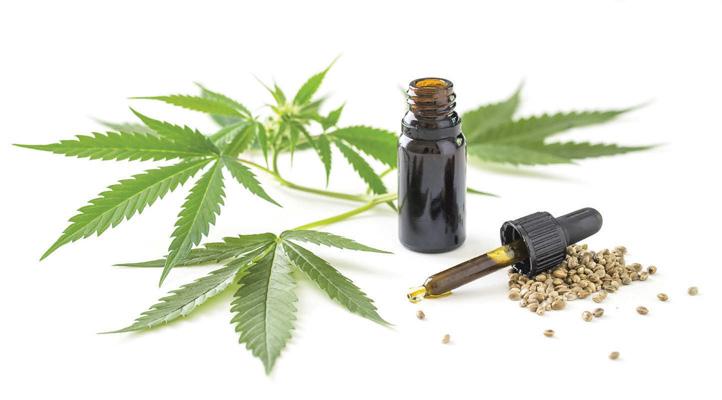
4 minute read
ASK THE NATUROPATHIC DOCTOR
CBD: Hope or Hype?
The best natural way to ease anxiety, insomnia, pain—and even Parkinson’s tremors—might be CBD BY EMILY A. KANE, ND, LAC
Advertisement
QIs CBD really a wonder medicine?
My clinical experience confirms that CBD can be effective for pain, anxiety, and insomnia, and can also help reduce Parkinson’s tremors. CBD is an extract of the cannabis plant, but unlike the more well-known extract, THC, it doesn’t get you high. In some states, you can legally buy products that contain both, but what’s of most interest is the non-hallucinogenic component in cannabis, CBD (cannabidiol).
What’s In a Name? The principal cannabinoids found in cannabis are CBD, CBG, CBN, and THC. These cannabinoids target receptors found throughout the body that are reported to help relieve pain, nausea, inflammation, and other symptoms. THC is the most abundant and widely known cannabinoid in cannabis, and is responsible for marijuana’s famous psychoactive effect. CBD, on the other hand, is a non-psychoactive cannabinoid that is thought to reduce pain, anxiety, inflammation, and more. CBD is known as a dopaminergic, meaning it helps stimulate cells that produce the calming neurotransmitter dopamine. This is why some research shows that CBD may help treat Parkinson’s
*Limonene (lemon peel) improves mood, reduces anxiety and depression, and boosts immunity.
tremors—one of the key factors in Parkinson’s is a reduction in the ability to produce dopamine.
CBG (cannabigerol) is the “parent” cannabinoid, and emerging research points to its potential to provide pain relief, lower inflammation, improve digestion, resolve skin conditions, and help treat cancer and neurodegenerative diseases.
Let’s Talk Terpenes The many pleasant terpenes in cannabis not only impart flavor and aroma, but also offer healing properties. These terpenes are widely represented elsewhere in nature in aromatic foods, spices, and tree resins, including broccoli, citrus fruits, mangoes, beer, basil, rosemary, cinnamon, and oregano. Here’s a quick overview:
*Alpha-pinene terpenes are said to help enhance focus and memory. They are also thought to have bronchodilator, anti-inflammatory, and antimicrobial properties. * LINALOOL (lavender) is a sedative, anti-epileptic, and analgesic that also can help reduce anxiety. * Myrcene (mango) is analgesic, muscle-relaxing, and antibiotic. * Beta-caryophyllene (clove), known as the “happy” terpene, reduces anxiety, lifts spirits, and acts as an antioxidant and antimicrobial.
What Kind of CBD to Buy Now that it’s legal to grow hemp in the U.S., a huge market has opened up for CBD products. CBD is found in both the hemp plant and marijuana plant, but only hemp-sourced CBD products are legal to sell in the U.S. The federal government defines legal hemp as containing no more than 0.3 percent THC.
When it comes to dosing, you’ll need to experiment. Figure out what you want—pain reduction, anxiety relief, easy sleep onset, mood boost— and do a little research. Start low, and experiment to find a dosage that works for you (see box below). Used judiciously, cannabis helps many ailments. Despite a history of being called a “gateway” drug to the bad stuff, cannabis is now being used ever more widely as medicine, including as an “exit” drug in opioid detox programs.
CBD Dosage Chart
SOCIAL ANXIETY: 10–25 mg daily for social anxiety, as needed IMPROVED SLEEP: 25–50 mg at bedtime daily for durability PAIN: 50–100 mg, once or twice daily as needed (CBD works best for nerve pain, like sciatica, as opposed to wound pain or migraine)
Fast Anxiety an d Stress Relief! * †






• Groundbreaking, clinically studied product to quiet your nerves and relieve your occasional anxiety


• Contains clinically studied EP107 ™ , a unique botanical exclusive to Terry Naturally




•
family since it is safe for all ages over 4






SAFE FOR ADULTS & CHILDREN (ages 4 & up)













